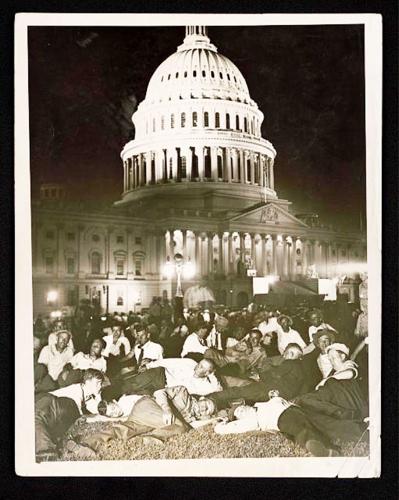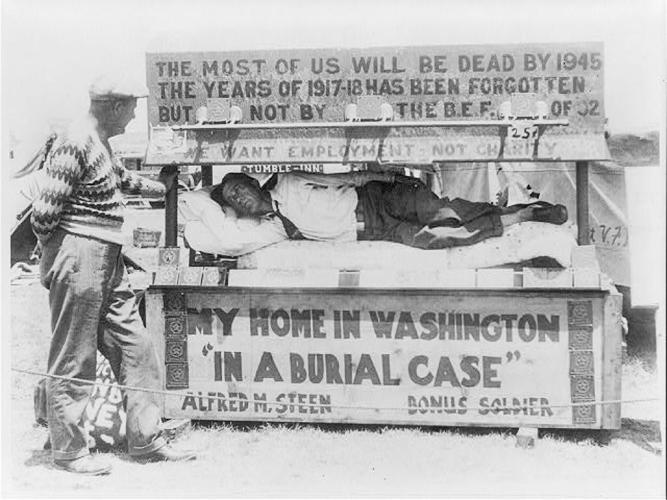July 28, 1932 was an eventful day with reverberations that were felt from Sylva to Washington, D.C.
To explain why, we’ll need a bit of a history lesson on the Bonus Army.
With the nation in the grips of the Great Depression, anywhere from 12,000 to 15,000 World War I veterans – many who brought along their wives and children – set up camps around the nation’s capitol demanding immediate payment of their wartime bonus service payment.
Bonus pay for that service had been approved by Congress in 1924, but full payment wasn’t scheduled to be delivered until 1945. The veterans were demanding the money to help ease their economic distress in 1932 instead of waiting another 13 years.
A large shantytown rose below the Capitol and along the nearby Anacostia River, and veterans vocally demanded action.
The Jackson County Journal of July 28, 1932, reported that Jackson County veterans were among the 2,000 state veterans planning to head to Washington, D.C., to join the “Bonus Expeditionary Forces.” The report noted, “The call for the Carolina veterans states that there will be no violence, that each veteran is expected to conduct himself as a gentleman, that discipline will be strictly enforced, and that the use of whiskey by the veterans is strictly prohibited. It is stated that the Southern and Seaboard Airline Railways have agreed to provide a sufficient number of box cars to transport the veterans directly from Charlotte to Alexandria, from where they will march to the White House on Monday. All veterans in North Carolina who are unemployed are invited by the call that has been issued from Charlotte headquarters…”
While reports of the behavior of the Bonus Army generally agree the group was well-behaved, there was no shortage of fearmongering regarding the army’s makeup and intent. Literally alongside the Journal’s report was Frank Parker Stockbridge’s weekly feature item, “Today and Tomorrow.”
Stockbridge wrote, “I half expected in Washington to find squads and detachments of the ‘Bonus Expeditionary Force’ panhandling all over town. … I talked with one man who had been active in getting Congress to appropriate $100,000 to send these men back to their home states. ‘Most of these chaps are decent follows out of jobs, with no resources, who just came for the lark,’ he said. ‘A few of them are rather simple-minded people who really think the government owes them a living. But in the center is quite a strong corps of Communist agitators, who have been hopeful that there would be some sort of a military or police demonstration that would give an excuse to start shooting.’ The Communists are looking for martyrs, but the Washington authorities have not permitted themselves to be trapped into anything out of which inflammatory propaganda could he made. But the B.E.F. certainly had some members of Congress badly scared.”
The “Bonus bill” in Congress to address the pay issue failed, and much of Bonus Army headed home.
But not all. And then came July 28.
On that day U.S. Attorney General William D. Mitchell ordered the Bonus Army removed from all government property. There was resistance, and shots were fired, leading to the deaths of two veterans. President Herbert Hoover ordered the U.S. Army to clear the Bonus Army campsites.
There were notable names in the military force; it was commanded by Douglas MacArthur and featured a detachment of six light tanks led by George S. Patton.
The veterans and their families were driven from their shantytown, which was burned along with their possessions.
The incident may have been the death blow to Hoover’s political career. The next year another Bonus Army came to Washington and was greeted by members of a new administration, including Eleanor Roosevelt. Again no “Bonus bill” was passed, but the Civilian Conservation Corps was created, giving jobs to many unemployed veterans. In 1936 a bill to disburse $2 billion in veteran benefits did pass Congress.
The Bonus Army is also credited for sewing the seeds of the G.I. Bill of Rights, which was passed in 1944.
With that, though the Bonus Army may have lost its battle, it won an important battle for future veterans for generations to come.




